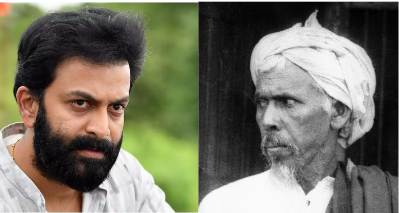A Malayalam movie titled ‘Vaariyamkunnan’ which had become the centre of controversy since last year for allegedly planning to glorify the anti-Hindu ‘Moplah riots’ has been shelved. The movie based on the life of Jihadists Variamkunnath Kunhamed Haji and Ali Musaliar – two main perpetrators, was supposed to venerate the Moplah riots and hogwash their roles in it. After the public backlash, controversial Malayalam actor Prithviraj and director Aashiq Abu decided to withdraw from the movie, forcing makers to drop the project altogether.
Prithviraj Sukumaran last year announced the movie and simultaneously falsely claimed that Variyam Kunnathu aka Variamkunnath Kunhamed Haji stood up against an empire that ruled a quarter of the world. The movie was to be produced by Zikandar and Moideen under the banner of Compassion Movies.
While the public resentment has forced the actor and director to step back, they have still kept the backdoor open by claiming they had creative differences with the producers. However, it won’t be easy for them to come back again. The netizens and the public is growing aware of the Moplah riots despite the Marxist historians trying their level best to sweep it under the carpet.
Modi government takes out Jihadists from the list of Martyrs
As reported by TFI, last month, a three-member committee of the Indian Council of Historical Research (ICHR) submitted a review report of the names of “freedom fighters” in the 1921 rebellion. The committee took a remarkable decision and decided to recommend removing the names of Variyankunnathu Kunjahammed Haji and Ali Musaliyar, from the Dictionary of Martyrs of India’s Freedom Struggle.
The ICHR, under the Ministry of Education, reviewed the entries in the fifth volume and concluded that the names of 387 “Moplah martyrs” need to be removed from the book. However, soon after the Islamo-leftist cabal of the country took offence with Congress leader Shashi Tharoor leading the charge. The Thiruvananthpuram MP vented his anger and tweeted that ICHR should be ashamed of itself.
He tweeted, “Communalising history is a deplorable project pursued narrow political ends, but rewriting the past to introduce communal divisions is to create false memories in a people who have been living in amity for generations… ICHR should be ashamed of itself.”
Communalising history is a deplorable project pursued narrow political ends, but rewriting the past to introduce communal divisions is to create false memories in a people who have been living in amity for generations: https://t.co/UCi6OqlYP0@ichr_1972 shd be ashamed of itself.
— Shashi Tharoor (@ShashiTharoor) August 23, 2021
The genesis
Most history books tend to give this portion a skip but the seeds of the Moplah riots were sown months earlier with the start of the Khilafat movement. What supposedly started as a freedom revolt against the British, ended up being an excuse to wipe out the Hindu population of northern Kerala.
At the end of the First World War, the Ottoman Empire started crumbling and was finally laid to rest in 1922. The Khilafat movement started by the Muslims of the subcontinent for reinstating the Ottoman Caliphate was given full backing by Congress led by Gandhi.
The Muslims of the country received a diktat from its overlords that overthrowing the British government can best be achieved by creating a kingdom of Islam. However, an Islamic world order didn’t have any place for kafirs and thus anti-Hindu riots broke out in all parts of the country with Moplah being the epicentre.
Read More: 100 years of Moplah Riots and sadly nothing has changed in Kerala
The number of Hindu deaths as a result of the genocide in Moplah amounted to around 10,000, and it is also estimated that over 1,00,000 Hindus were forced to leave Kerala in the wake of the massacre.
Not only the Hindus were killed and forced to flee, but close to 100 Hindu temples were also destroyed by Islamists during the carnage. Notably, the then pro-Khilafat leaders had passed resolutions of “congratulations to the Moplahs on the brave fight they were conducting for the sake of religion.”
Annie Besant described the events in her book ‘The Future of Indian Politics’ as: “They murdered and plundered abundantly, and killed or drove away all Hindus who would not apostatize. Somewhere about a lakh of people were driven from their homes with nothing but the clothes they had on, stripped of everything. Malabar has taught us what Islamic rule still means, and we do not want to see another specimen of the Khilafat Raj in India”.
The cancelling of the contentious movie is a victory for Sanatan Dharma. Understanding history is important, for those who forget it, are doomed to repeat it. And it’s even more important to stand the ground against those who try to victimize the villains and marauders who killed and butchered thousands of innocent Hindus.
